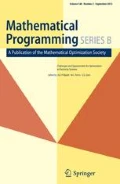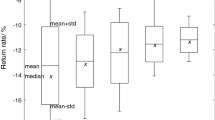Abstract
In this paper we study ambiguous chance constrained problems where the distributions of the random parameters in the problem are themselves uncertain. We focus primarily on the special case where the uncertainty set  of the distributions is of the form
of the distributions is of the form  where ρ
p
denotes the Prohorov metric. The ambiguous chance constrained problem is approximated by a robust sampled problem where each constraint is a robust constraint centered at a sample drawn according to the central measure
where ρ
p
denotes the Prohorov metric. The ambiguous chance constrained problem is approximated by a robust sampled problem where each constraint is a robust constraint centered at a sample drawn according to the central measure  The main contribution of this paper is to show that the robust sampled problem is a good approximation for the ambiguous chance constrained problem with a high probability. This result is established using the Strassen-Dudley Representation Theorem that states that when the distributions of two random variables are close in the Prohorov metric one can construct a coupling of the random variables such that the samples are close with a high probability. We also show that the robust sampled problem can be solved efficiently both in theory and in practice.
The main contribution of this paper is to show that the robust sampled problem is a good approximation for the ambiguous chance constrained problem with a high probability. This result is established using the Strassen-Dudley Representation Theorem that states that when the distributions of two random variables are close in the Prohorov metric one can construct a coupling of the random variables such that the samples are close with a high probability. We also show that the robust sampled problem can be solved efficiently both in theory and in practice.
Similar content being viewed by others
References
Anthony, M., Biggs, N.: Computational Learning Theory. Cambridge University Press, 1992
Artzner, P., Delbaen, F., Eber, J.P., Heath, D.: Coherent risk measures. Math. Finance 9, 203–228 (1999)
Ben-Tal, A., Nemirovski, A.: Robust truss topology design via semidefinite programming. SIAM J. Optim. 7 (4), 991–1016 (1997)
Ben-Tal, A., Nemirovski, A.: Robust convex optimization. Math. Oper. Res. 23 (4), 769–805 (1998)
Ben-Tal, A., Nemirovski, A.: Robust solutions of uncertain linear programs. Oper. Res. Lett. 25 (1), 1–13 (1999)
Ben-Tal, A., Nemirovski, A.: Lectures on Modern Convex Optimization. SIAM, Philadelphia, PA, 2001
Bertsimas, D., Sim, M.: Robust conic optimization (May 2004). Under review in Math. Prog.
Birge, J.R., Wets, J.R.B.: Designing approximation schemes for stochastic optimization problems, in particular for stochastic programs with recourse. Math. Prog. Study 27, 54–102 (1986)
Blumer, A., Ehrenfeucht, A., Haussler, D., Warmuth, M.K.: Learnability and the Vapnik-Chervonenkis dimension. J. ACM 36 (4), 929–965 (1989)
Calafiore, G., Campi, M.C.: Uncertain convex programs: Randomized solutions and confidence levels, 2003. To appear in Math. Prog.
Calafiore, G., Campi, M.C.: Decision making in an uncertain environment: the scenario-based optimization approach, 2004. Working paper
Charnes, A., Cooper, W.W.: Uncertain convex programs: randomized solutions and confidence levels. Mgmt. Sc. 6, 73–79 (1959)
Chen, Z., Epstein, L.: Ambiguity, risk and asset returns in continuous time, 2000. Mimeo
Dudley, R.M.: Distance of probability measures and random variables. Ann. Math. Stat. 39, 1563–1572 (1968)
Dupačová, J.: The minimax approach to stochastic program and illustrative application. Stochastics 20, 73–88 (1987)
Dupačová, J.: Stochastic programming: minimax approach. In: Encyclopedia of Optimization. Kluwer, 2001
El Ghaoui, L., Lebret, H.: Robust solutions to least-squares problems with uncertain data. SIAM J. Matrix Anal. Appl. 18 (4), 1035–1064 (1997)
El Ghaoui, L., Oustry, F., Lebret, H.: Robust solutions to uncertain semidefinite programs. SIAM J. Optim. 9 (1), 33–52 (1998)
Epstein, L.G., Schneider, M.: Recursive multiple priors. Tech. Rep. 485, Rochester Center for Economic Research, 2001. Available at http://rcer.econ.rochester.edu. To appear in J. Econ. Theory
Epstein, L.G., Schneider, M.: Learning under Ambiguity. Tech. Rep. 497, Rochester Center for Economic Research, 2002. Available at http://rcer.econ.rochester.edu.
Erdoğan, E., Iyengar, G.: Approximation algorithms for ambiguous chance constrained problems. February, 2004
de Farias, D.P., Van Roy, B.: On constraint sampling in the linear programming approach to approximate dynamic programming, 2001. To appear in Math. Oper. Res.
Föllmer, H., Schied, A.: Convex measures of risk and trading constraints. Fin. and Stoch. 6, 429–447 (2002)
El Ghaoui, L., Nilim, A.: The curse of uncertainty in dynamic programming and how to fix it, 2002. To appear in Oper. Res.. UC Berkeley Tech Report UCB-ERL-M02/31
Gibbs, A.L., Su, F.E.: On choosing and bounding probability metrics. Intl. Stat. Rev. 7 (3), 419–435 (2002)
Gilboa, I., Schmeidler, D.: Maxmin expected utility with non-unique prior. J. Math. Econ. 18 (2), 141–153 (1989)
Goldfarb, D., Iyengar, G.: Robust portfolio selection problems. Math. Oper. Res. 28 (1), 1–38 (2003)
Hansen, L.P., Sargent, T.J.: Robust control and model uncertainty. American Economic Review 91, 60–66 (2001)
Iyengar, G.: Robust dynamic programming 2002. To appear in Math. Oper. Res.. Available at http://www.corc.ieor.columbia.edu/reports/techreports/tr-2002-07.pd f
Jagannathan, R.: Minimax procedure for a class of linear programs under uncertainty. Oper. Res. 25, 173–177 (1977)
Kearns, M.J., Vazirani, U.V.: An introduction to computational learning theory. MIT Press, Cambridge, MA, 1997
Long, P.M.: The complexity of learning according to two models of a drifting environment. Machine Learning 37 (3), 337–354 (1999)
Nemirovski, A.: On tractable approximations of randomly perturbed convex constraints. In: Proc. 42nd IEEE Conf. Dec. Contr. (CDC), vol. 3, 2003, pp. 2419–2422
Nemirovski, A., Shapiro, A.: Scenario approximations of chance constraints, 2004. To appear in Probabilistic and randomized methods for design under uncertainty
Rachev, S.T.: Probability metrics and the stability of stochastic models. John Wiley & Sons, 1991
Rockafellar, R.T.: Convex analysis. Princeton University Press, Princeton, New Jersey, 1997
Ruszczynski, A., Shapiro, A. (eds.): Stochastic Programming. Handbook in Operations Research and Management Science. Elsevier, 2003
Ruszczynski, A., Shapiro, A.: Optimization of risk measures (2004). Available at http://www.optimization-online.org/DB_HTML/2004/02/822.html
Ruszczynski, A., Shapiro, A.: Optimization of risk measures (2004). Available at http://ideas.repec. org/p/wpa/wuwpri/0407002.html
Shapiro, A.: Some recent developments in stochastic programming. ORB Newsletter 13, 2004. Available at http://www.ballarat.edu.au/ard/itms/CIAO/ORBNewsletter/issue13. shtml#11
Shapiro, A., Ahmed, S.: On a class of minimax stochastic programs, 2004. To appear in SIAM J. Opt.
Shapiro, A., Kleywegt, A.J.: Minimax analysis of stochastic problems. Optimization Methods and Software 17, 523–542 (2002)
Strassen, V.: The existence of probability measures with given marginals. Ann. Math. Stat. 36, 423–439 (1965)
Thorisson, H.: Coupling, Stationary, and Regeneration. Probability and its Applications. Springer-Verlag, 2000
Vapnik, V.N.: The Nature of Statistical Learning Theory. Springer, New York, NY, 1995
Žáčková, J.: On minimax solutions of stochastic linear programs. Čas. Pěst. Mat. 1966, pp. 423–430
Author information
Authors and Affiliations
Corresponding author
Additional information
Research partially supported by NSF grant CCR-00-09972.
Research partially supported by NSF grants CCR-00-09972, DMS-01-04282, and ONR grant N000140310514.
Rights and permissions
About this article
Cite this article
Erdoğan, E., Iyengar, G. Ambiguous chance constrained problems and robust optimization. Math. Program. 107, 37–61 (2006). https://doi.org/10.1007/s10107-005-0678-0
Received:
Accepted:
Published:
Issue Date:
DOI: https://doi.org/10.1007/s10107-005-0678-0
Keywords
- Robust optimization
- Stochastic programming
- Learning Theory
- Coupling of random variables
- Ambiguity in measure
- Sample approximation
- VC dimension



